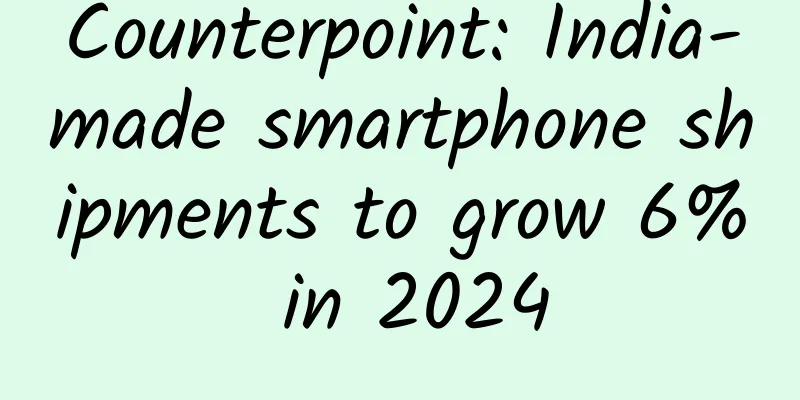Counterpoint: India-made smartphone shipments to grow 6% in 2024

|
According to Counterpoint's India Manufacturing Service Report, driven by the export growth of Apple and Samsung, the shipment of "Made in India" smartphones will increase by 6% year-on-year in 2024. Apple and Samsung together account for about 94% of India's total smartphone exports. In order to achieve the national goal of reducing import dependence and strengthening the position of the global supply chain, both brands have significantly expanded their production scale in India. The Indian government's PLI (Production Linked Incentive) program has effectively promoted global manufacturers to set up or expand production bases in India, ultimately leading to the improvement of local manufacturing capabilities. In 2024, Taiwanese manufacturers accounted for 44% of the total domestic smartphone manufacturing in India, Chinese mainland manufacturers accounted for 30%, Indian local manufacturers accounted for 21%, and Korean manufacturers accounted for 5%. In 2025, Indian local smartphone manufacturing is expected to achieve double-digit growth, and local added value will continue to increase. Focusing on manufacturing companies, research analyst Tanvi Sharma said: "In 2024, Samsung achieved a year-on-year growth of 7% through export growth, continuing to consolidate its leading position in India's electronics manufacturing. Vivo ranked second with a year-on-year growth of 14%. The expansion of offline channels and the strengthening of distribution networks helped it gain a 14% shipment share. According to our shipment tracking data, Vivo also won the championship of smartphone shipments in India in 2024. Foxconn Hon Hai achieved an annual growth of 19% relying on Apple orders, and plans to establish a smartphone display module assembly line to strengthen local manufacturing capabilities. OPPO fell to fourth place with a year-on-year decline of 34% due to intensified brand competition and an increase in the proportion of OPPO/realme outsourcing. Thanks to the expansion of cooperation with Xiaomi and realme, DBG also achieved double-digit growth in 2024." Tata Electronics, with the iPhone 15/16 series as its main driving force, achieved a year-on-year growth rate of 107% in 2024, becoming the fastest growing manufacturer. The company not only expanded its iPhone assembly business, but also entered the chip manufacturing industry through the Dholera semiconductor plant in Gujarat, while building an OSAT (outsourced semiconductor assembly and testing) plant in Assam. Through mergers and acquisitions and diversified cooperation, Tata Electronics has developed into a key player in the global electronics supply chain. In the overall mobile terminal market (smartphones + feature phones), Dixon topped the list of manufacturers thanks to strong shipments of Transsion and Motorola. In the smartphone industry, Dixon achieved 39% annual growth through new cooperation with Transsion and Realme. Multi-brand strategic cooperation and joint venture models have enabled it to achieve significant growth in the Indian terminal manufacturing ecosystem. |
Recommend
What effect does Pu'er tea have on the stomach? Which is better, Pu'er tea cake or loose tea?
Raw Pu'er tea refers to fresh tea that is nat...
How do women get urinary tract infections? What are the factors?
Among cases of urinary tract infection, female pa...
How much does it cost to do a NT test
NT ultrasound examination is an important examina...
How to get rid of acne
Acne is a very common condition for people with o...
What causes varicose veins of the vulva?
I believe many of my friends are familiar with va...
What are the white bumps at the vaginal opening?
Women may have such a problem that small white bu...
What are the benefits of eating saury for women? Why can't you eat too much saury?
Saury is a kind of aquatic food with particularly...
Can I take a hot spring bath when I am pregnant?
After a woman becomes pregnant, no matter what sh...
Can donkey-hide gelatin regulate menstruation?
Donkey-hide gelatin is a famous Chinese medicinal...
What are the symptoms of pregnancy biochemistry?
There must be many people who don’t know what bio...
What are the dangers of vulvar leukoplakia
Vulvar leukoplakia is a common gynecological dise...
What are the hazards of teeth cleaning during pregnancy?
Teeth cleaning can prevent periodontal diseases a...
Pictures of vaginal wall bulging after normal delivery
Choosing natural childbirth is a natural delivery...
Precautions during obstetric care
During the daily work of the hospital, the develo...
How to treat mild cervical erosion
Cervical erosion is a disease that troubles women...









